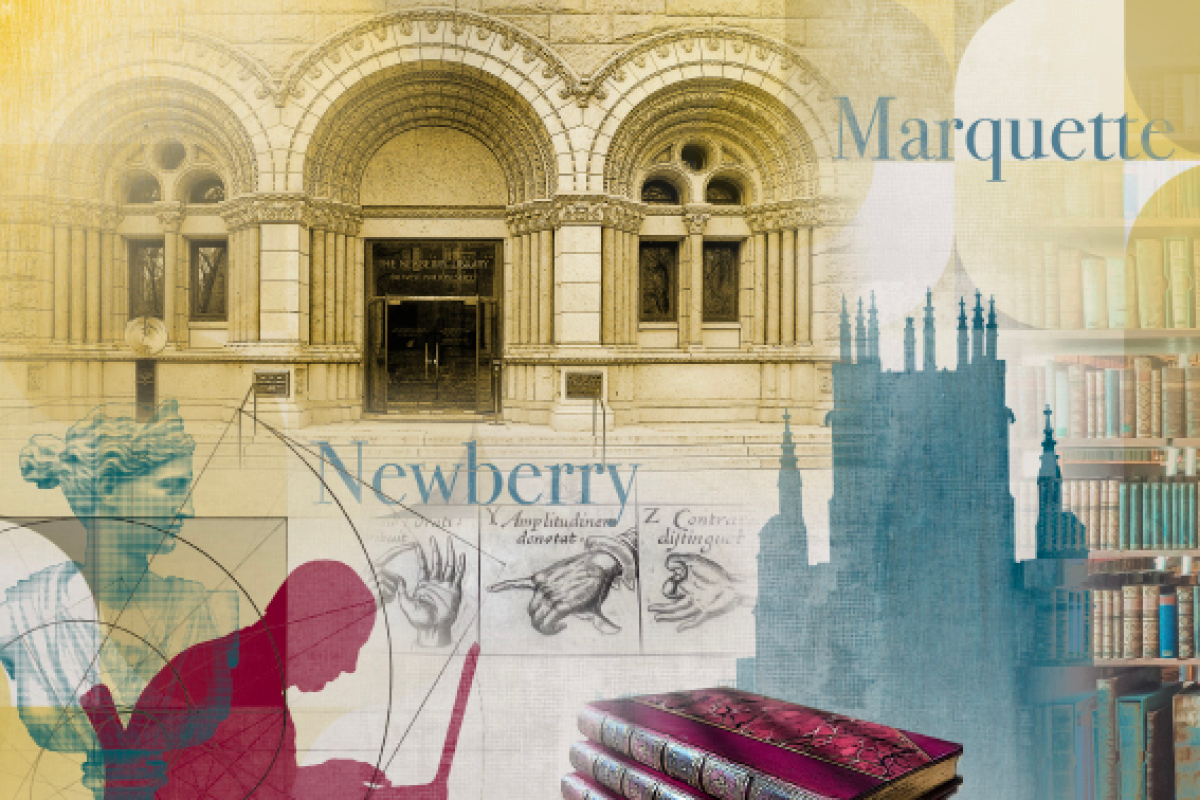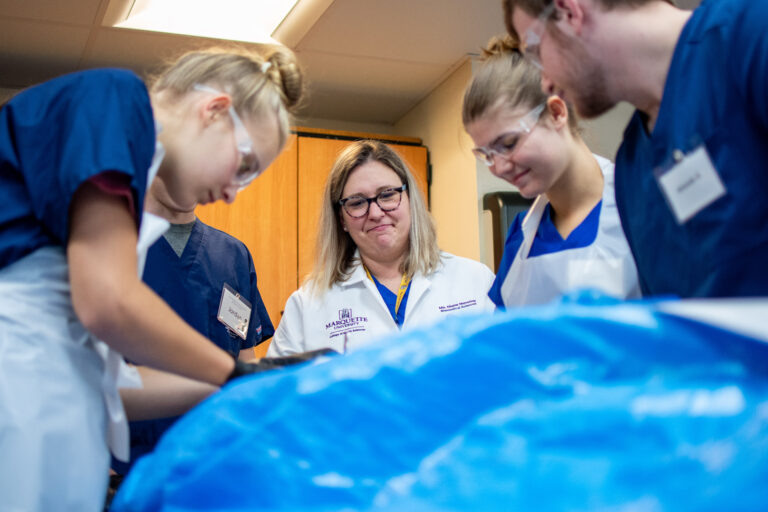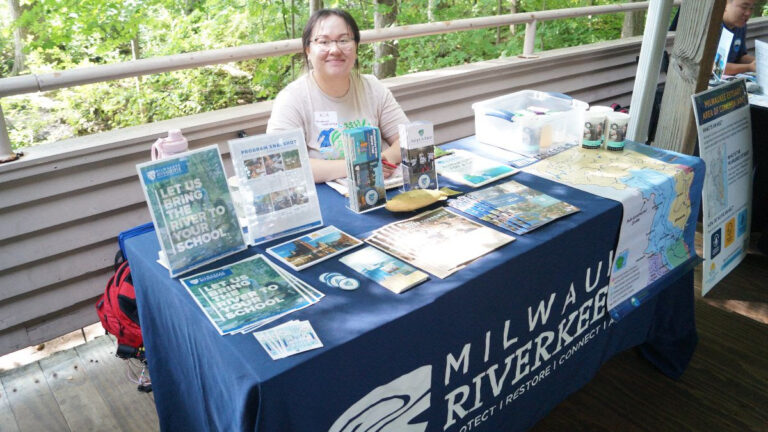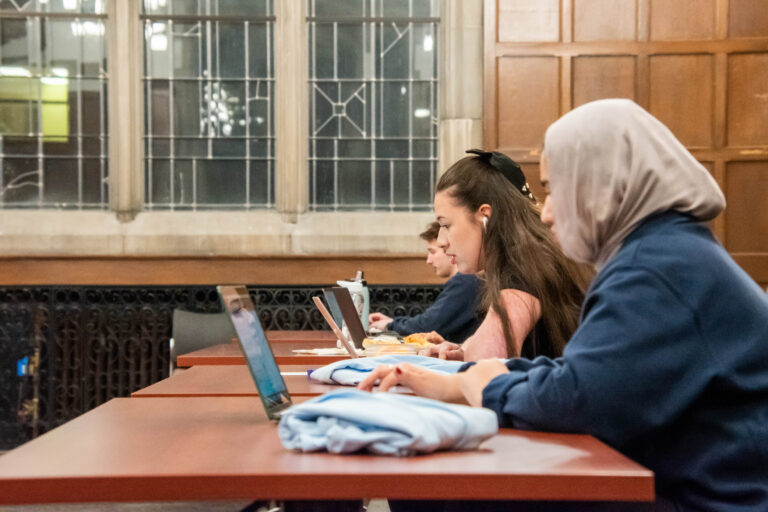Membership in the Newberry Library’s Center for Renaissance Studies Consortium opens doors — and valuable funding and fellowship opportunities — for Marquette scholars.
To better understand the present, sometimes it helps to look to the past.
“When I read about the social worlds depicted in 18th-century literature, they feel somewhat familiar to our own time, but in other ways they feel so distant,” says Dr. Jason Farr, associate professor of English.
Farr’s research focus on the portrayal of disabled individuals in European Enlightenment-era literature earned him a prestigious residential fellowship at the Newberry Library’s Center for Renaissance Studies to research his second book, Deaf Resonances: Deafness, Sound, and Multimodal Communication in Eighteenth-Century Literature.
The Newberry, located in Chicago and renowned for its collections in history, religion, arts and culture, has been a research hub for dozens of Marquette scholars since the 1980s. Its storied collections hold rare texts on a rainbow of topics across the humanities dating back hundreds of years. And Marquette’s status as a member of the Newberry’s Center for Renaissance Studies Consortium positions the school for world-class funding and fellowship opportunities in humanities research.
Being able to study at the Newberry gave Farr access to an extensive collection of 18th-century writing about deafness, including treatises about some of the earliest mentions of formal education for the deaf. “It was an absolute dream,” he says. “To have the time and space to focus entirely on my research is an extraordinary thing, and I didn’t take it for granted.”
Connecting with fellow scholars
Newberry scholars are also given opportunities to connect with others in adjacent fields during their residencies. That’s especially helpful when working on a solitary and sometimes lonely project like a book, says Dr. Laura Matthew, associate professor of history.
Matthew was recently the Evelyn Dunbar and Ruth Dunbar Davee fellow at the Newberry, where she researched her forthcoming book, Those Who Survived: Trade and Mobility on Mesoamerica’s Mar del Sur, c. 1600. The book focuses on the experiences of Indigenous peoples living in Mesoamerica when Spanish colonists first arrived in their lands. By tracking down the stories of specific people and goods that were documented during that time, she seeks to put a human face on the disastrous effects of colonization in Latin America.
“We enjoyed the incredible luxury of uninterrupted time to work on our projects in community: sharing frustrations and latest discoveries, relaxing together over lunch, reading drafts and supporting each other’s wild flights of fancy — which often turned out to be key insights,” Matthew says.
The rare books and documents held at the Newberry collections were a priceless resource for Matthew. Among them were historical records dating to the 1600s. Detailed accounts from 19th- and 20th-century Latin American historians, anthropologists and archaeologists also helped fill in the blanks about economic and social changes in the region.
“These older works of scholarship are incredibly rare and often describe lost historical documents or places that have dramatically changed,” Matthew says. “Nearly every time I needed such a book, the Newberry had it.”
Time to write
Giving scholars time to write and research is one of the most valuable facets of the long-term Newberry fellowships, adds Dr. Lezlie Knox, chair of the Department of History. She has been a Newberry representative for over a decade, helping facilitate student and faculty involvement in programs at the library.
Not only does Marquette’s membership in the Newberry’s Center for Renaissance Studies Consortium fund long-term research and grants, but it also opens up educational opportunities for graduates and undergraduates alike. Students studying Spanish, history and English have attended field trips to the Newberry, and some have taken semester-long courses and given presentations.
Dr. Albert Rivero, the Louise Edna Goeden Professor of English, was the recipient of a Newberry fellowship back in 1984 that helped him finish his first book. Today, he is one of Marquette’s representatives for the Renaissance Studies Consortium.
“It’s only a select group of schools that are members of a consortium like this,” Rivero says. Not only does membership boost access to timeless resources for students and professors, it also denotes Marquette’s status as a serious player in the field of Renaissance studies.
“Being a member is a statement about the importance and value of humanities research by Marquette faculty and students,” Knox says. There are 51 schools in the global consortium, which has representatives across North America and Europe. And the waitlist to join is about 25 years long, Knox adds.
Collaboration with other Newberry centers, such as the D’Arcy McNickle Center for American Indian and Indigenous Studies, gives scholars even more access to collections and opportunities for collaboration. “It also is why the consortium is developing programs on the cutting edge of premodern studies,” Knox says.




